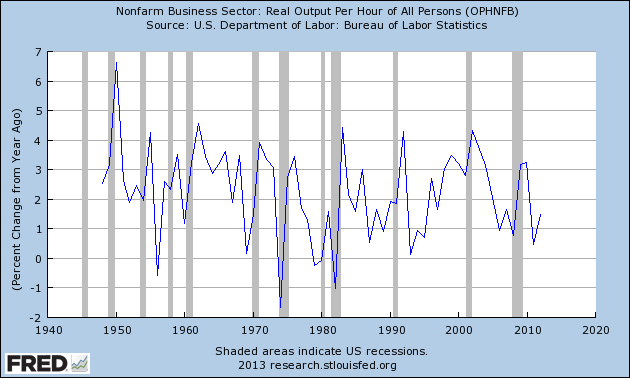December 24, 2013
Lydia DePillis warns us in the Post of 8 ways that robots will take our jobs. It is amazing how the media have managed to hype the fear of robots taking our jobs at the same time that they have built up fears over huge budget deficits bankrupting the country. You don’t see the connection? Maybe you should be an economics reporter for a leading national news outlet.
Okay, let’s get to basics. The robots taking our jobs story is a story of labor surplus, too many workers, too few jobs. Everything that needs to be done is being done by the robots. There is nothing for the rest of us to do but watch.
There can of course be issues of distribution. If the one percent are able to write laws that allow them to claim everything the robots produce then they can make most of us very poor. But this is still a story of society of plenty. We can have all the food, shelter, health care, clean energy, etc. that we need; the robots can do it for us.
Okay, now let’s flip over to the budget crisis that has the folks at the Washington Post losing sleep. This is a story of scarcity. We are spending so much money on our parents’ and grandparents’ Social Security and Medicare that there is no money left to educate our kids.
Some confused souls may say that the problem may not be an economic one, but rather a fiscal problem. The government can’t raise the tax revenue to pay for both the Social Security and Medicare for the elderly and the education of our kids. This is confused because if we are living in the world where the robots are doing all the work then the government really doesn’t need to raise tax revenue, it can just print the money it needs to back its payments.
Okay, now everyone is completely appalled. The government is just going to print trillions of dollars? That will send inflation through the roof, right? Not in the world where robots are doing all the work it won’t. If we print money it will create more demands for goods and services, which the robots will be happy to supply. As every intro econ graduate knows, inflation is a story of too much money chasing too few goods and services. But in the robots do everything story, the goods and services are quickly generated to meet the demand. Where’s the inflation, robots demanding higher wages?
In short, you can craft a story where we have huge advances in robot technology so that the need for human labor is drastically reduced. You can also craft a story where an aging population leads to too few workers being left to support too many retirees. However, you can’t believe both at the same time unless you write on economic issues for the Washington Post.
Just in case anyone cares about what the data says on these issues, the robots don’t seem to be winning out too quickly. Productivity growth has slowed sharply over the last three years and it is well below the pace of 1947-73 golden age. (Robots are just another form of good old-fashioned productivity growth.)

On the other hand, the scarcity mongers don’t have much of a case either. Even if productivity growth stays at just a 1.5 percent annual rate its impact on raising wages and living standards will swamp any conceivable tax increases associated with caring for a larger population of retirees.







Comments